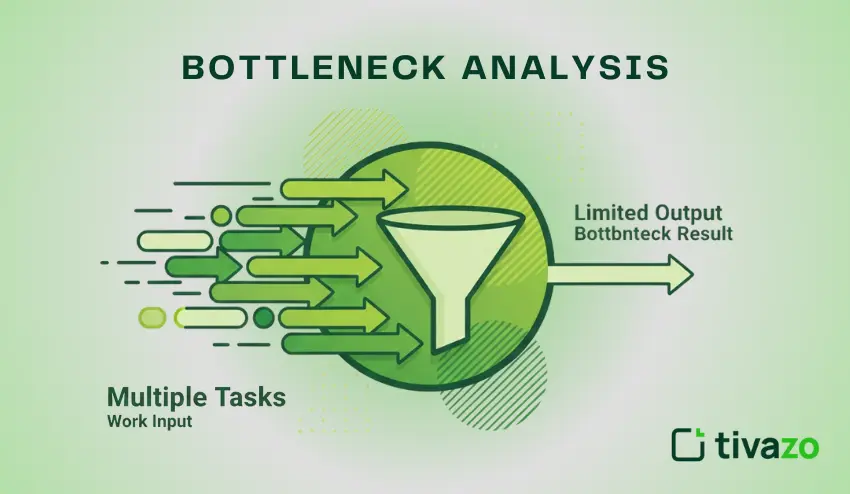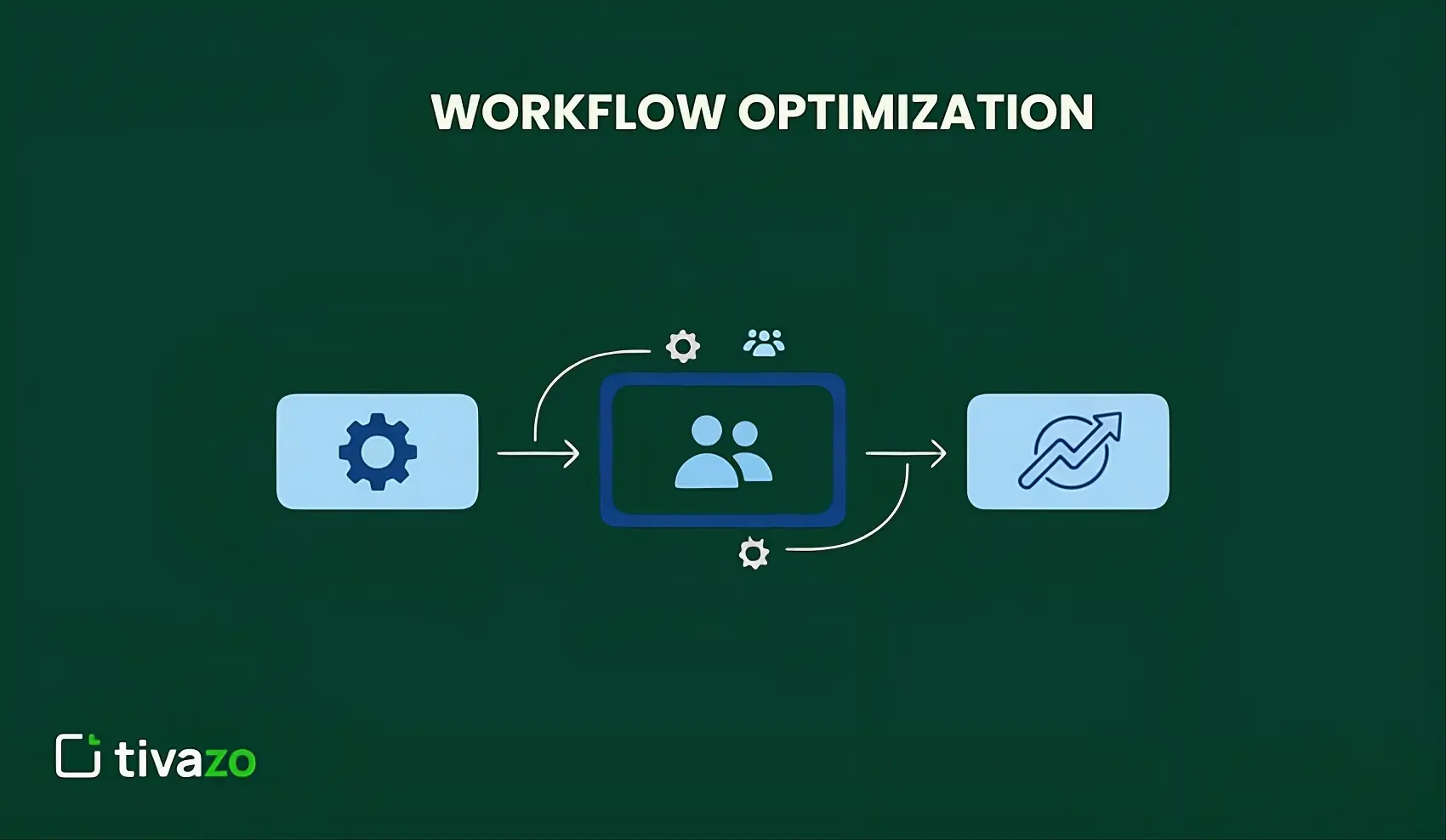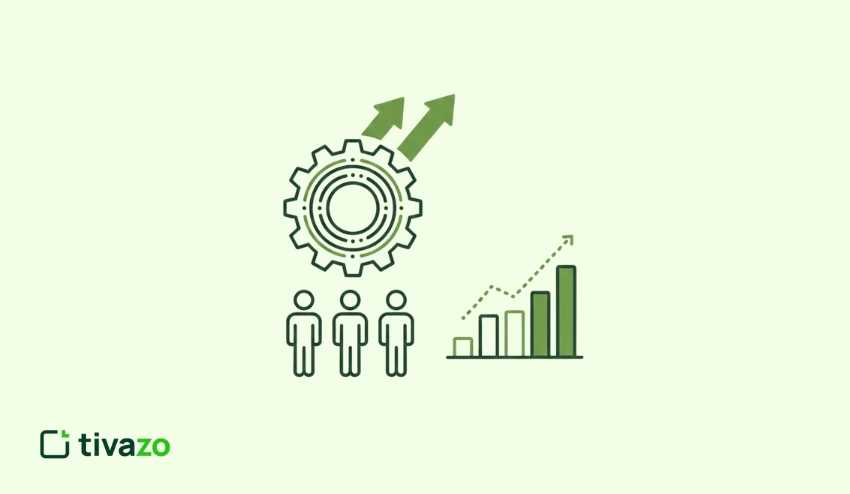Being proactive in the workplace implies being proactive, looking ahead, and finding solutions to challenges before they happen. When employees learn to manage themselves and also have ownership of tasks, they not only enhance productivity in the workplace but also portray a leadership attitude and responsibility. You can improve your professional development, improve your decision-making, and embrace positive working behaviors that will make a practical difference in your career by learning how to be proactive at work.
This blog will discuss the real meaning of being proactive, the importance of being proactive, the 5 P’s of being proactive, tips that can be applied in practice, real-life examples, and the advantages of developing proactive habits. And we will demonstrate how TIvazo would enable you to develop and sustain these habits in order to reach long-term success. Learning how to be proactive in the workplace will help you grow professionally, increase your decision-making competency, and develop good work habits that will actually help in your career.
What does it mean to be proactive?
To be proactive is to be in charge of things as opposed to reacting to them as they occur. At the workplace, it is being able to foresee obstacles, plan, and take initiative to address issues before they grow out of proportion. A proactive worker does not wait to be told what to do, he/she find an opportunity and manage his/her time and are responsible for what he/she do.
Proactive behavior is directly associated with self-management skills, decision-making skills, and a high level of accountability. Through positive thinking, the employees have the potential to enhance productivity in the workplace, embrace positive work behaviors, and make their team and organization successful. It is simply about being one step ahead and making things happen rather than letting things happen to you.
Why is being proactive at work important?
Proactiveness in the workplace is vital to career development, personal progress, as well as efficiency in the workplace. Leadership mentality, accountability, and problem-solving behavior characterize employees who are taking initiative and have foreseen challenges, and this occurs in any organization, making them distinguished employees.
Being proactive can assist in time management, prioritization of activities, and take up of positive working habits that enhance productivity. It can enable you to solve possible problems before they turn into barriers to a smoother flow and more efficient work of the team. Also, being a go-getter in your work demonstrates that you are dedicated to your job and that managers provide information to you that you are responsible and capable of working with responsibility.
In the contemporary competitive business world, it is not merely a soft skill to be proactive but a winning strategy. You can become a better decision-maker, foresee difficulties, and add to the objectives of your team, at the same time promoting your own professional development by learning how to be proactive at work.
What are the 5 P’s of being proactive?
Making proactive gives a simple model that can assist employees to act, organize their tasks, and enhance productivity in their workplaces. Through these principles, you will be able to acquire self-management and a proactive attitude that will lead to your personal and professional development.
1 . Prioritize
Prioritize on most important activities. Being proactive, the employees apply time management techniques to find out the activities with the most impact and address them before they are submerged by less significant tasks.
2. Plan
Expect difficulties and develop practical plans to accomplish objectives. It is always important to plan in advance so that when you face an expected challenge, you are ready to deal with it and not behave under stress.
3. Prepare
Prepare to have the ability, knowledge, and resources. By being ready, you will be able to deal with any spontaneous situation with ease and hold on to a steady performance level.
4. Perform
Be proactive and perform activities without being instructed on what to do. Accountability, taking of responsibilities, and commitment to get results are some of the performance characteristics manifested in proactive performance.
5. Prevent
Early detection of risks and possible problems will help to avoid the aggravation of problems. Employees who are proactive will solve the issues before they turn into significant setbacks and work towards a more straightforward workflow and team success.
Using the 5 Ps, you not only get to know how to be proactive at work, but also develop good working habits, build your decision-making ability, and improve overall productivity in the workplace.
15 Proven Tips on How to Be Proactive at Work
Proactivity in the workplace is not only about not being idle, but being able to foresee problems, be proactive, and formulate solutions to these problems before they occur. When employees learn to manage themselves and own up to their duties, they are able to perform better and make sound decisions in the team, which leads to team success. Here, we will discuss 15 effective ideas on how to be proactive at work, including practical tips, practice examples, and how to embrace positive working habits that help to be productive and develop professionally.
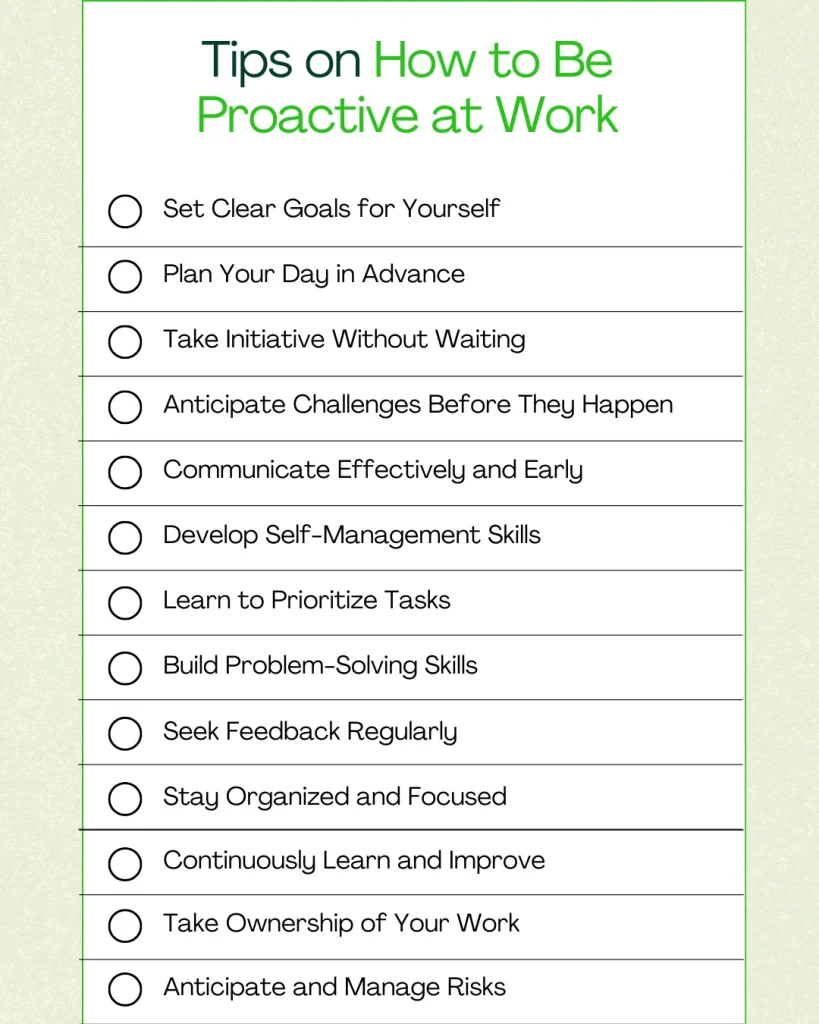
1. Set Clear Goals for Yourself
The basis of being proactive in the workplace is to set clear goals. When you clarify what you desire to accomplish, you draw a plan of action. The short-term goals can assist you in managing your daily activities, whereas the long-term goals can give you a career growth vision. You will be able to monitor the progress, keep yourself motivated, and make sure that each step will help you develop professionally by establishing specific goals.
Goal setting also enables the employees to focus on the tasks and also expect difficulties before they occur. You have targets and can know them, then you can identify some probable obstacles and strategize how to overcome them. Goal setting allows one to be proactive and therefore be accountable, improve decision-making processes, and also make oneself feel that he or she owns his or her work.
2. Plan Your Day in Advance
Preparation of your day beforehand is an important process towards creating proactive skills in employees. With planning and prioritizing, you will be able to spend your time effectively, avoid the last-minute rush, and keep track of deadlines. Time management techniques can enable you to concentrate on activities that have a high impact and which can deliver positive results for your team and personal performance.
Everyday planning also enhances self-management and makes sure that you are always focused on the long-term goals. You lessen the chances of making decisions on the spot when you can predict what has to be done and plan your work process. Proactive planning assists in keeping good working habits, increasing productivity at the workplace, and also having better control of your career life.
3. Take Initiative Without Waiting
Taking initiative even before one is requested is one of the hallmarks of proactive behavior. Independent employees have a leader-like mentality, accountability, and a high level of responsibility. With the ability to find opportunities and proactively solve problems, you will make your team successful and will be a reliable professional.
Being proactive in the workplace will also develop confidence and problem-solving. By doing things without instructions, you get to know that you have to see ahead, seek solutions, and put them into action. This proactive style promotes constant development, high productivity in the workplace, and creates a reputation of being a person who owns jobs and duties.
4. Anticipate Challenges Before They Happen
To be proactive means to think and plan beforehand about possible hurdles. Predicting difficulties in the workplace will enable you to put preventive measures, reduce interruptions, and ensure a smooth process of work. The ability to be a step ahead helps decrease the risk of crisis management and allows one to approach situations without any panic and react wisely.
The ability to anticipate challenges is also beneficial in decision-making and in adopting positive work habits. Active employees are able to analyze trends, spot risks, and come up with contingency plans to prevent issues before they get out of control. Such an attitude shows responsibility, increases professional development, and makes you a worthy asset to the success of your organization.
5. Communicate Effectively and Early
Active communication will make everybody on track and on par. The communication of progress, plans, or possible problems to your team and managers keeps them informed and increases cooperation. Early communication will enable you to solve the issues before they escalate into bigger problems and make informed decisions.
Communication is also a good way of building relationships and accountability. Proactive information sharing among the employees illustrates a mindset of leadership and a desire to work as a team. Effective communication assists in predicting difficulties, resolving issues in the workplace, as well as making the working environment positive and productive.
6. Develop Self-Management Skills
Self-management skills are critical to having an active approach. This entails managing your time, priorities, and emotional reactions so that even when you are under pressure, you are still able to be focused and productive. Once employees know how to control themselves, they are able to foresee obstacles, work independently, and make wise decisions without being under supervision.
When you develop self-management skills, you will form good work habits and will be responsible in your duties. Active employees are multi-taskers who uphold professional development and are reliable. Good self-management also promotes improved problem-solving, increased productivity at the workplace, and your overall performance as a professional.
7. Learn to Prioritize Tasks
Task prioritization enables you to concentrate on activities that have a high impact and lead to results. Thoughtful employees analyze their duties, what is urgent and important, and spend resources on it. Priorities will be well planned and will guarantee that the deadlines are met, the objectives are reached, and the stress is reduced.
The uninterrupted prioritization also assists in the formation of good working habits and enhances the ability to make decisions. Knowing what counts the most will enable you to predict the possible bottlenecks and deal with the challenges beforehand. This will make you more productive at work and will also show a leader-like attitude to any project you deal with.
8. Build Problem-Solving Skills
Proactive behavior is all about problem-solving. When staff members are able to analyze and find solutions and apply them efficiently, small problems will not be turned into significant challenges. A proactive way of solving problems enhances productivity in the workplace, the ability to make decisions, and a feeling of responsibility.
Professional development is also increased by developing good problem-solving skills. A logical and creative attitude to challenges is a sign of a leadership mindset, awareness of possible risks, and positive work habits. Being an active problem solver will make you a reliable and resourceful team member.
9. Seek Feedback Regularly
The proactive employees are characterized by actively seeking feedback. Positive feedback allows us to point out areas of improvement, to refine strategies, and to improve the performance of the workplace. Asking your peers and managers to contribute to you allows demonstrating accountability and the desire to learn continuously.
Self-assessment and reinforcement of good working habits are also promoted by proactive feedback seeking. By responding to feedback, you can predict difficulties and refine your decision-making capabilities by altering strategies. When employees accept feedback in a professional manner, they increase their productivity and become proactive employees in the company.
10. Stay Organized and Focused
Proactive behavior requires organization. When tasks, deadlines, and resources are properly structured, it is possible to plan responsibilities effectively and prevent reactive stress. A structured work environment and workflow promote concentration, optimize workflows, and improve productivity.
By staying focused, self-management and decision-making abilities are also enhanced. Proactive employees are future-oriented; they foresee challenges, and they manage time. Being organized will aid in building good working habits and ensure that you are always up to the professional standards.
11. Continuously Learn and Improve
Proactive workers are those who value continuous learning in order to keep ahead in their careers. By maintaining the new skills, industry trends, and workplace best practices, you are able to foresee challenges and adjust faster. Ongoing development enhances problem-solving competencies, decision-making skills, and professional development.
Another positive aspect of learning that is always developed is good work habits and leadership attitude. Being a person who takes initiative by actively pursuing knowledge shows that you are a proactive individual who owns his or her development, which will increase the overall productivity in the workplace.
12. Take Ownership of Your Work
Ownership implies being devoted to your work and doing it to the end. Ownership employees will know what has to be done, make plans, and execute them without supervision. Such an attitude proves responsibility, trustworthiness, and a proactive attitude towards work.
The ownership also serves to make sure that problems do not get out of hand and also facilitates productivity at the workplace. The accountability aspect of the results will help you gain more knowledge on solving problems, embracing healthy work habits, and making your team and organization successful.
13. Anticipate and Manage Risks
Anticipatory risk management leads to a smoother working process and avoids problematic occurrences. Such employees are able to make contingency plans, solve problems in advance, and ensure a steady performance. Risk management shows responsibility, visionary, and leadership attitude.
Proper risk management also increases decision-making and good working habits. By preventing and avoiding challenges at their early stages, you protect productivity, assist team goals, and ensure professional development.
14. Build Strong Relationships
Good relationships at the workplace assist you in being predictive of the challenges, cooperate in finding solutions, and transferring knowledge. It is through building trust, communication, and cooperation that you provide the environment in which proactive behavior will flourish. Problem-solving and decision-making are also made easy through a positive relationship.
Development of good relationships enhances accountability and a culture of support at the workplace. Proactive employees use such relations to boost productivity, team goals, and exhibit leadership mentality in their day-to-day engagement.
15. Reflect and Adjust Regularly
The reflection is an important proactive employee tool. Through the analysis of successes, failures, and improvements, you can make corrections that would improve future performance. Self-assessment helps in enhancing problem-solving skills, decision-making skills, and good working habits.
The ability to change your strategies according to your reflections enables you to foresee the difficulties, take initiative, and enhance productivity in the workplace. Reflective employees are always proactive, help employees grow professionally, and make valuable contributions towards team success.
These 15 tips will help you become a proactive person who can achieve the benefits of being more productive, making better decisions, and growing as a professional. Being proactive, predicting difficulties, and developing the right work attitudes will make you a strong and dependable worker in any organization.
Being proactive examples
Being proactive at work means taking initiative, anticipating problems, and acting before situations become urgent. It’s about owning your responsibilities, finding solutions, and contributing to overall workplace productivity tips rather than just reacting to events.
Examples of being proactive:
- Updating information ahead of deadlines – For instance, correcting outdated data before a client presentation shows ownership and problem-solving skills.
- Anticipating your manager’s needs – Preparing reports or summaries in advance and highlighting key insights demonstrates initiative professionally.
- Helping colleagues before they ask – Offering guidance or resources to teammates fosters collaboration and strengthens workplace relationships.
- Improving processes – Suggesting workflow improvements, automating repetitive tasks, or refining communication channels prevents future bottlenecks.
By practicing these proactive behaviors, you not only enhance decision-making skills but also develop positive work habits that boost productivity and professional growth. Incorporating small proactive actions daily makes you a reliable, forward-thinking, and valuable employee.
How to be proactive instead of reactive at work
Being proactive in the workplace as opposed to being reactive implies being able to take charge of the situation as opposed to responding to the situation when it comes up. Reactive employees can be stressed, feel rushed, or unprepared since they react to things that have occurred, while proactive employees think ahead, plan, and take strategic action to avoid things. To create a proactive attitude, a person needs to develop self-management skills, decision-making skills, and positive work habits.
👉Related: Reactive vs Proactive Management: 5 Powerful Moves
The first step towards changing reactive behavior to proactive behavior is planning and prioritization tasks. Employ time management techniques to plan your workload, prioritize high-impact activities, and plan ahead to address any possible challenges before they get out of control. As an illustration, rather than waiting for a client to call and clarify the absence of information, a self-assured employee ensures that all the information needed is ready and confirmed beforehand. This not only shows accountability but also enhances productivity and problem-solving in the workplace.
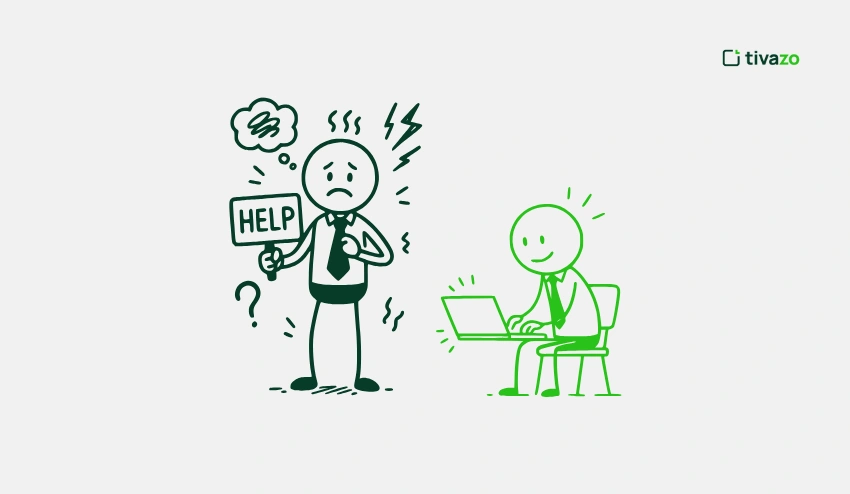
Benefits of being proactive
There are many benefits of being a proactive employee, which will not only make you a better employee but also enhance the performance of your team. Here are the key benefits:
1. Enhanced Productivity
Anticipatory staff envisage problems beforehand and prepare in advance, and this would aid them in getting work done effectively and ensuring unequivocal performance.
2. Better Decision-Making Skills
Being proactive and future-oriented will enable you to make wise choices instead of making decisions under stress, which will ensure that problem-solving in the workplace is enhanced.
3. Career Growth and Advancement
Proactive behavior, like ownership and leadership attitude, endears you to the employer as a dependable and worthwhile employee.
4. Improved Workplace Relationships
Proactive communication and collaboration build a level of trust, teamwork, and a good working environment.
5. Reduced Stress and Crisis Management
The foreseeing of the possible problems prior to their development into emergencies will help avoid crises at the last minute and enable the workflow to be smoother.
Being proactive at work means that you will not only increase productivity and work-related stress but also enhance decision-making, develop positive work habits, and fast-track career development.
How Tivazo Can Help You Build and Maintain Proactive Habits
Think of how it is possible to begin your working day exactly knowing where your time will be spent, what you have to do urgently, and how you can avoid the last-minute stress. This is what it is like to be proactive in the workplace, and that is where Tivazo comes in. Instead of responding to crises or rushing to meet deadlines, Tivazo provides you with a clear view of your daily workflow to allow you to plan ahead and gain control over your productivity.
It is simple with Tivazo to know how you are spending your time, the projects that are falling behind, and the places where you can intervene to make a difference. In one instance, you can identify the tasks that would result in bottlenecks by monitoring your work hours and examining the productivity trends, and correcting them before they get out of control. This will assist you in keeping up with deadlines, working efficiently, and building self-management skills, which is one of the main points of learning how to be proactive at work.
Tivazo also advises you to own your duties. Its in-depth performance analysis enables you to identify areas of improvement, strategize on how to solve them, and implement them without having to be instructed to do so. With time, such a proactive behavior becomes a routine: you expect challenges and can work with your team in a more productive manner, and always follow positive work habits that contribute to your personal development and the team’s performance.
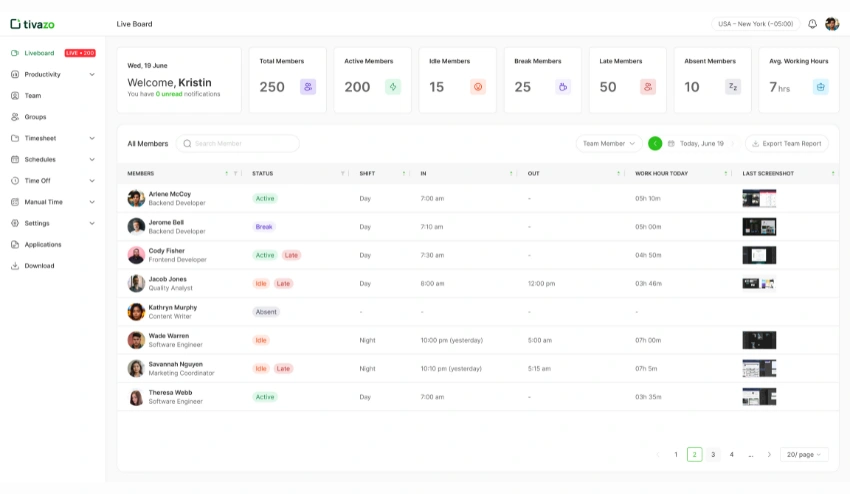
When you start incorporating Tivazo into your day-to-day life, you do not simply monitor your work; you develop a proactive attitude. It allows you to be ahead of your game, make more effective choices, and get things sorted out before they turn into a problem, and thus proactive behavior becomes a way of life as far as your career is concerned.
Conclusion
Being proactive in the workplace implies initiating, foreseeing, and acting in advance of issues, which will enable you to enhance your decision-making process, improve self-management, and build effective work practices that will increase productivity and career. When you have clear goals, prioritize, and evaluate performance, you are a step ahead and can take the duties and responsibilities in your stride.
Such tools as Tivazo help to pursue this active strategy and give you an idea about what you are doing, monitor the progress, and take ownership of the activities. Knowing how to be proactive at work not only causes the stress to decrease and efficiency to increase but also makes one a dependable, progressive, and most valuable employee in any organization.

